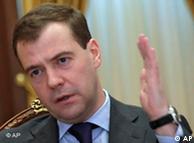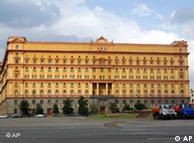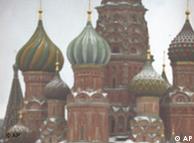HUMAN RIGHTS | 16.07.2010
Russian Duma approves bill widening powers of KGB successor
The Duma, Russia's lower house of parliament, has approved a bill empowering the country's secret police, the FSB, to call citizens in for "precautionary talks" for potential crimes agents believe may be committed in the future.
Under the law, FSB officials would require no evidence to take such action, which proponents of the new powers have said would be intended to prevent the possibility of a later criminal act "against the country's security."
 Medvedev spearheaded the FSB initiative
Medvedev spearheaded the FSB initiative
The bill had been proposed by President Dmitry Medvedev and passed the 450-seat lower house of parliament with 354 votes. Most of the supporters were from the ruling United Russia party.
The country's upper house, the Federation Council, must approve the bill before it can be sent to Medvedev, whose signature would turn it into law.
Return of KGB?
But in an open letter to the council, democracy and rights groups have denounced the bill, saying it would herald in a return to conditions under the KGB, the Soviet-era predecessor to the FSB.
Critics have said the powers could be used to intimidate government opponents and suppress protests. In fact, three activists from the opposition Yabloko party were arrested outside the Duma for protesting the law as it was passed.
Signatories of the letter include the President of the Moscow Bar Association, Genry Reznik; the chairwoman of the Moscow Helsinki Group, Lyudmila Alexeyeva; the head of the Russian human rights organization Memorial, Oleg Orlov; as well as writers and members of the opposition.
Change in atmosphere
 Opponents of the bill have said it gives too much power to agents in the FSB headquarters
Opponents of the bill have said it gives too much power to agents in the FSB headquarters
An 80-year-old veteran human rights campaigner Sergei Kovalyov said he believes the authorities are afraid of mass unrest, like the 2004 Orange Revolution in Ukraine. He said there has not been a particular reason or event that necessitates giving extra powers to the security services.
"Nobody can mention a particular event, because a change in atmosphere is not an event," Kovalyov said. "But we all feel it. And [the bill's initiators] are without any doubt the people who are in power, for no-one else can initiate such measures. They also feel this change in atmosphere."
Medvedev, meanwhile, defended the bill. When questions were raised about the bill during a press conference with German Chancellor Angela Merkel on Thursday in Yekaterinburg, Medvedev, reluctant at first to address the subject, said it was perfectly normal for a country to update security policy.
"Every country has the right to improve its laws, including those on the security services, and we will do that," Medvedev said. "What is happening now, I would like you to know that, is being done on my direct orders."
Author: Geert Groot Koerkamp, Matt Zuvela, Darren Mara (dpa/AP)
Editor: Sean Sinico


No comments:
Post a Comment